







 |
 |
 |
 |
 |
 |
 |
 |
Many fans think Sue was less powerful before John Byrne wrote the book in the 1980s. It's true that her power was increased by the Skrull ray (see issue 215) but the difference was small, as these older pictures demonstrate:
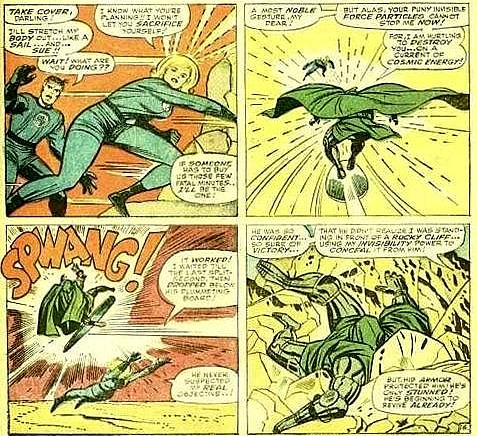


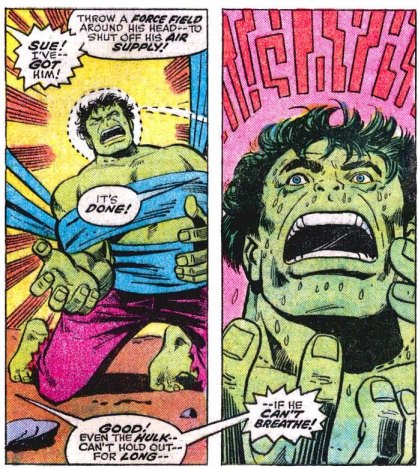
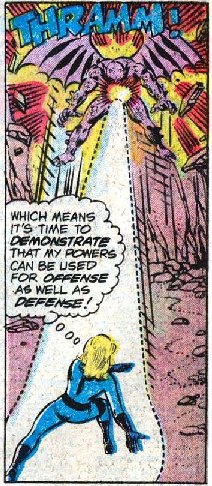
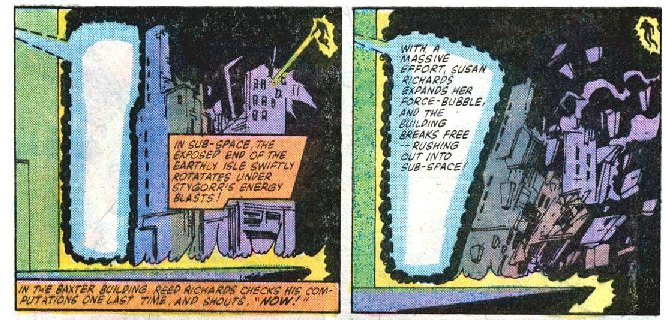
Many fans think Sue was less skillful before Byrne. Really? Then how did she do this?
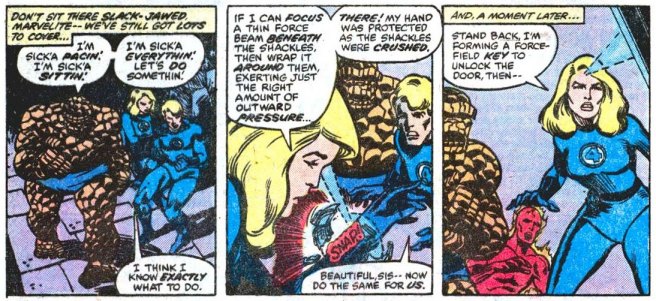
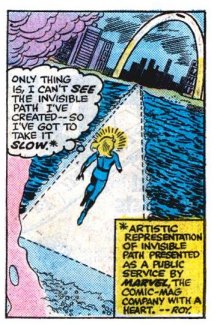
Or this?
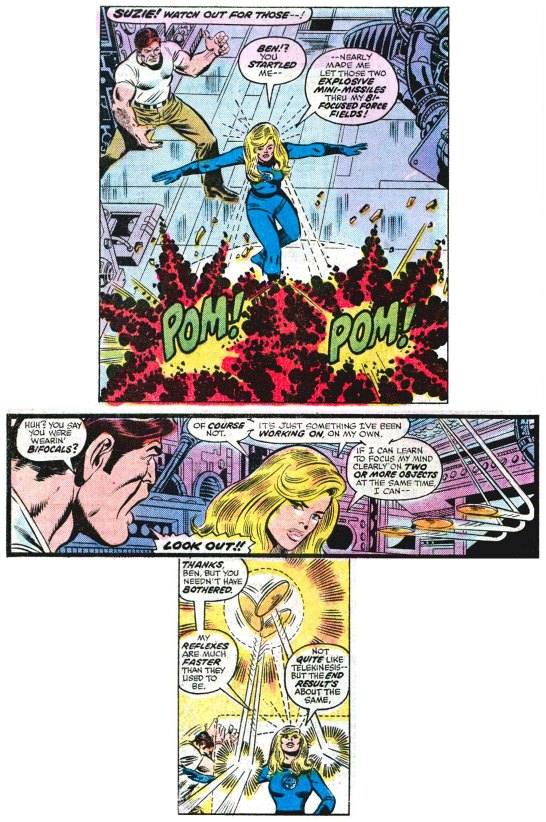
Many fans think Susan was not independent until Byrne's run. Then how do we explain these?

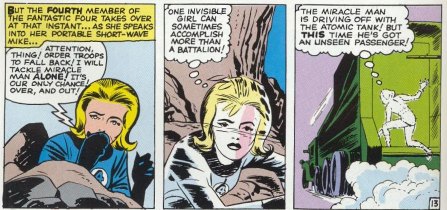
Or these?
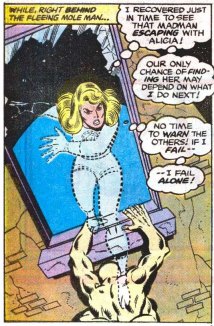
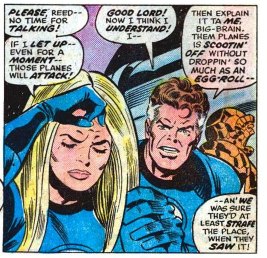
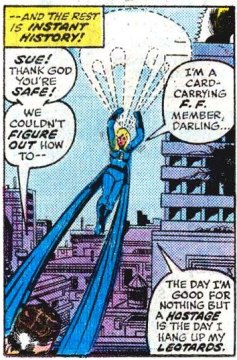
Or these?

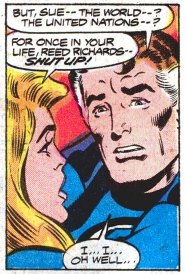
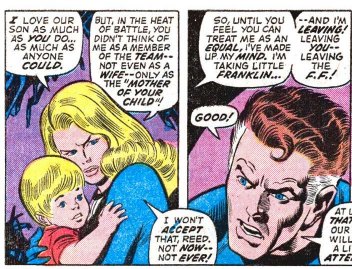
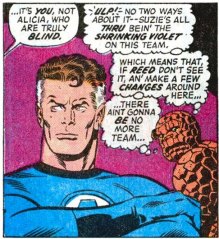
In the early days, Sue had no powers, other than to turn invisible, and that gave her no advantage over her regular enemies: Doom had high sensing tech equipment, Namor had a radar sense, the Mole Man's monsters were used to the dark, the Super-Skrull had heightened hearing, etc. Unlike Reed, Ben and Johnny, Sue put herself into real mortal danger whenever she stepped out of the door. So she is easily the bravest member of the team.
Sue also had the hardest early life - Ben was a popular college sports star, Reed was a millionaire, Johnny had no worries beyond playing with cars - and it was Sue who had to act as his mother. (Their real mother died when they were young and their father was in jail.) It is no wonder that Sue always longed for a normal family and nice clothes - the teenage years that she missed.
But it's true that her default position was to agree with Reed where possible. This just happened to be the rational position: in early life she chose, and captured, the smartest man on Earth. In areas that require focused specialist intelligence, Reed is generally right. It is merely logical to agree with him and seek his lead on most questions. However...
Reed sees the details, but Sue sees the big picture. When Sue disagrees with Reed, Sue is usually right, and in a big way. Such as the time when the recognized that the Skrulls represent a threat to the universe:
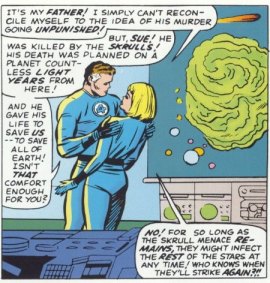
Or when she realized that the Atlanteans do not need to be our enemies.
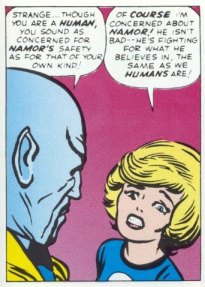
- a sensitivity that kept Ben on the team, turned Dragon Man from enemy to friend, and helped her see that Gorr was not an enemy, but was trying to save the world.
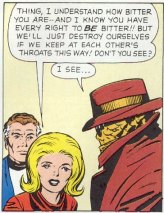
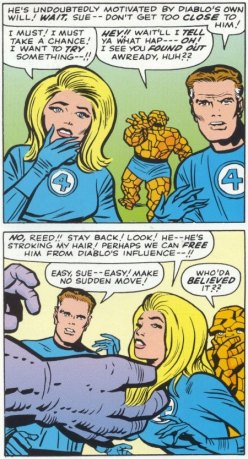
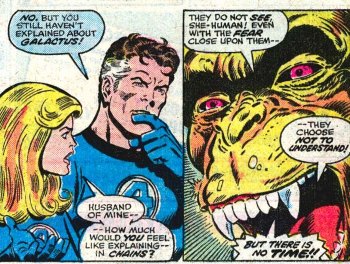
Reed needs her around. Not just because he falls to pieces without her (as when they separated), but because he needs Sue to state the obvious, like the time he disastrously sold the team - a decision that almost led to World War Three.
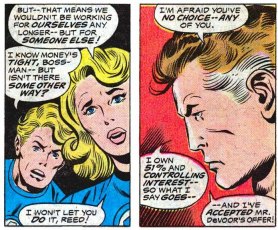
But the biggest contribution that Sue makes is to see the elephant in the living room: the central fact that Reed cannot see: their priority must be Franklin. Sue understands this intuitively - there is no evidence that she has weighed the arguments coldly, but as usual she is right.
Reed understands that the world needs the FF, but he fails to realize that Franklin is more powerful than all of them combined. So the biggest thing the FF can do to save the world is to nurture Franklin.
Reed's blindness is most clearly seen in FF216-217, where Blastaar defeats the entire Fantastic Four, then Franklin defeats Blastaar with just a look. Then Reed decides to send Franklin off to the nanny! Sometimes Reed is incredibly stupid. If only he listened to Sue he'd do far more good for the world, and be happier too.
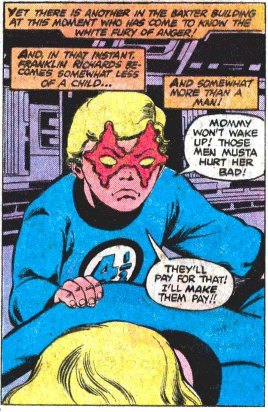
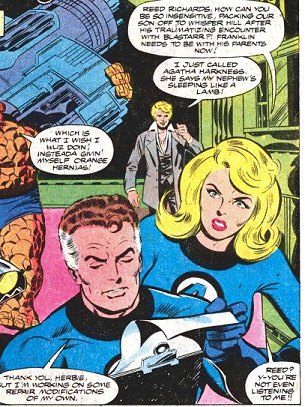

Susan Storm, the Invisible Girl, was a revolution in comics.
Until Sue, superhero comics were about aggression. People solved
their problems by, essentially, hitting other people. even the
noble types, like Wonder Woman, relied primarily on force. Then
Sue came along and showed that you can solve your problems in
other ways, and those other ways are usually more effective.
Although having said that, she hit Ben years before Reed ever hit her.

In their first battle with Doom, Sue is captured, but is able to defeat Doom by turning his own machine against him, so that Doom's actions cause his own downfall. Sue then rescues the men. At no point did she ever engage in direct conflict.
Sue was the only one to recognize that the Sub-Mariner is not evil, just misunderstood. Eventually he became an ally. Considering the size of the oceans and the technology at Namor's disposal, this alone may have saved the human race.
Galactus was first defeated because Alicia (Sue's lookalike, and another non-violent character) impressed the Silver Surfer. Sure, the Ultimate Nullifier was the final straw, but why the the Watcher break his oath to help us? Was he really so impressed by our ability to fight? No, it was nonviolence that impressed him, as practiced by the likes of Alicia and Sue.
Later (FF175) Galactus is beaten for all time (potentially) wit the help of the Impossible Man. Why did Impy choose to help us? He never showed an interest in that before. But Sue had shown compassion, and that touched his heart (or whatever popuppians have instead of hearts).
Throughout this website there are many examples. Time and again Sue helps to solve the biggest conflicts, when all other heroes, heroes who rely on violence, are helpless.
Sue was always the strongest member of the Fantastic Four, But comic readers, filled with the adolescent love of violence, often could not see it.
The case against Sue's methods was made forcibly by Carol Strickland, in the letters pages of Fantastic Four 216 and 221 (thanks to Doc Shallot of the FF board for the scans). I will address each issue later on. Strickland's love of violence has to be seen to be believed:

An editor replies:

Strickland came back (in issue 221):

Not everyone agreed with Strickland of course. This is a letter from a few years earlier, by a young comic reader called Kurt Busiek (I wonder what became of him?)

Strickland's views are now considered orthodoxy, thanks to John Byrne's influential work:
Strickland's letters were published in Fantastic Four 216 and 221. Both were penciled by John Byrne, and 221 was written by Byrne. By the time the issues came out, due to the time delay in publishing, Byrne was starting his plans for being permanent artist and writer, beginning with 232. So he would almost certainly have read those printed issues as he decided on his new direction.
It may be coincidence, but Byrne did pretty much everything Strickland suggested: Sue became far more aggressive, she used force fields in new and aggressive ways, and she had a major emotional crisis. In interviews, like Strickland, Byrne gave his opinion that Sue was too weak. The most obvious Strickland suggestion was the flying forcefield. Byrne wrote several issues around the time that Strickland was writing (but too soon to see her letters, due to the publishing time lag), and he shows an interest in new uses for her fields, such as creating a diving bell in 221. But he never makes her fly. After Strickland's suggestion Byrne's next issue was 232. In it, Sue immediately has the idea of flying.

On this page I hope to show that, before Byrne, Sue was more powerful: she had bigger force fields (e.g. pushing over a city block or saving a village from an explosion), she used her force fieldsforcefields in more sophisticated ways (e.g. creating keys, pincers, etc.), she was more successful at achieving her objectives (principally, keeping Franklin safe), and she was happier and ce with herself.
Apart from "flying," Byrne changed Sue in one notable way: he added pain. Byrne's Sue was less at peace, felt more trapped, and was emotionally violated. This may have been influenced by Strickland's suggestions, but others have observed a common theme in all of Byrne's superhero women. A statistical analysis of Byrne's women compared with his men shows the women are far more likely to be helpless or tortured. (If the link is dead, Google "Don't Do That To Me Again" by "zan".) Sue was tortured between three and five times in Byrne's run, depending how we define torture:
I am neutral on the Girl-Woman name change. Sue should be judged on her actions, not her name. Besides, if being a "girl" is demeaning, what about being called a "Thing"? I am more concerned by the implication, judging from Byrne's Sue, that being a woman means being harder, more aggressive, and subject to rape, misery and torture. But I am male, a comics fan boy (sorry, a fanman - is there such a word?) so what do I know? I will instead quote a female science professor:
"My college and grad school friends were quite insistent on being called women and not girls, in part because the male students were referred to as Men, and it was annoying to be considered a girl when our peers were considered Men. [In contrast,] My students [including grad students in their thirties] said they didn't think of their male peers as men, just as guys, dudes, boys, whatever. My most talented, independent, smart, energetic female students call themselves girls, and I know they see themselves as the equal (or better) than their male peers, so the girl/woman thing clearly doesn't have the baggage that it used to.
"Perhaps there were a few decades in the late 20th century when "woman" was considered a positive term that was worth insisting on, but now that's over."
Byrne's name change, from the mid 1980s, is right in the middle of that period. Ironically it is now just as historically dated as Sue wearing an apron or Reed smoking a pipe.
There are many examples of Sue, pre-Byrne, acting independently and sometimes aggressively. But it is clear that aggression is not in her nature. My thesis is that aggression is not strength and sensitivity is not weakness. To test that claim, let us find the worst claims against Sue, as identified by Strickland and others.Strickland accuses Sue of fainting. Well sure, they all faint, for various reasons, often exhaustion. At least Sue never fainted while driving the Fantasti-car, unlike Reed.

Reed fainted again due to stress in FF148 and in FF184. Yet it's Sue, not Reed, who is accused of fainting and fans want her to leave? Hmm... who's being sexist again?
Let's look at the allegedly worst example of Sue fainting. It is claimed that in FF 41, Sue faints simply because Ben threatens her. But if you read the comic you see a different story:
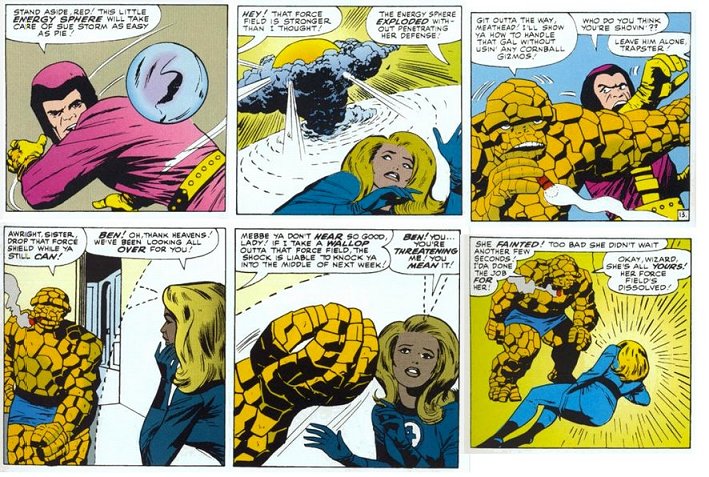
The Trapster had devised a bomb specifically to burst Sue's field "as easy as pie." At this stage the Trapster was still smart (a chemistry genius who could pilot a fighter plane). If he designed a device to "easily" burst Sue's field you can guarantee it was designed to exceed the maximum beating she could take. Just look at the explosion: readers in 1964 would recognize that shape immediately: it's like a NUCLEAR BOMB!!!!!
We know that Sue's mind feels every hit on her forcefield. Yet somehow, through sheer courage she survived! She should have collapsed yet she still stood! The slightest additional physical or mental shock would have floored her at this point.
Then the Thing appears to give her a further mental shock. Remember that damage to her forcefield is mental. Also look at the picture - there are speed lines. it is clear that Kirby intended this movement to be the action that led to the collapse. If it struck a glancing, warning blow to the forcefield, how heavy would that be?
At this stage the Thing was between his ten ton limit (at the end of Strange Tales) and his multi thousand ton level (on the Skrull world). Also, being under the control of the Wizard, he was not exercising self restraint as he normally did. It is safe to assume that this glancing blow would be at least half a ton - the equivalent of dropping a small car on her head.
Even if that movement never connected, we still have to face the fact that Sue should not have been standing! It is the classic case where the hero is hit with an atom bomb, seems to be still standing, then is knocked down by a feather. Except if he did connect, even a glancing blow, it was a feather that weighed half a ton.
So let's see: Sue gets a nuclear bomb to the head, and still needs an extra push to knock her down. Women eh? What wimps.
Strickland and others refer to Sue needing to be rescued. But they forget all the times that Sue rescues the others.


In the early days Sue was physically the weakest by far, so obviously she was easier to capture. One critic claimed:
"The Fay Wray days began in her very first public appearance, twisting in the clutches of the Mole Man's monster on the cover of FF #1. Hard to believe, but the one member of the Fantastic Four who could turn herself invisible was then captured by Miracle Man, Dr. Doom, Namor and the Puppet Master in the span of six issues (FF #3-8)."
Let us look at these examples.
FF1:
The cover was symbolic: that event never happened in the book. Sue was never captured. She was however the weakest member, and that made her the bravest - she went into battle with the others, acting as nothing but living bait, while having no way to defend herself.
The Miracle man:
She was the only one captured because she was the only one who went after him! It's easy to remain un-captured if you stay at home, bickering, showering, or standing around smoking a pipe. Sue's capture allowed the FF to locate the Miracle Man before he had a chance to make plans, so he made mistakes and thus was defeated. All thanks to Sue.


Dr Doom:
As shown earlier, in this issue Sue single handedly defeated Doom and rescued the others.
Namor:
As shown earlier, Namor was a massive threat, and only Sue could see the truth: that they did not need to fight. Thanks to Sue, he was unwilling to go too far, and thanks to Sue, the others finally accepted him and he came to fight on the good guys' side. Once again Sue saves the day.
The Puppet Master:
Yes, the Puppet Master captured Sue. But only because he captured the Thing first! By the "weak characters get captured" logic, the Thing must be the weak one. The rest of the FF were later able to find the Puppet Master only because Sue escaped and alerted them to his location. The Puppet master was not beaten by the FF, but by Alicia, the one who looked just like Sue, had no powers, and was blind! So we see that the "weak" females are the strongest where it matters - getting results.

Aggression is less effective than courage and understanding. But when aggression is needed, Sue delivers. She creates forcefield bullets and battering rams, she destroys and suffocates and hammers as needed.
There is no denying it, Sue loves clothes and hair. Sue never had a childhood, she has never known anything ordinary or shallow. She craves shallowness because she almost never gets it! As soon as she was old enough she had to look after her irresponsible brother, Johnny. As for their parents, read up about Franklin Storm. By the time that Johnny was sixteen, she got involved with Reed Richards. She wanted to be looked after for a change. Can you blame her?
But that didn't go as planned - she ended up as a superhero. Her brother was finally growing up, and instead of being free, she has to care for the whole world instead! Worse, she is a superhero with almost no powers! She has to run into deadly danger every day, and she is the only one who can be hurt, she is only the one who cannot defend herself. She is more aware of the dangers than the boys, and sometimes points out risks, but she never complains.
Sue never wanted any of this. She just wanted an ordinary life. She should have been privileged. Her father was a top surgeon, her boyfriend a wealthy famous scientist. She should have spent her time at parties and on holidays. Any chance she gets she wants to just do her hair or wear nice clothes and pretend that the world does not depend on her for a few minutes. Wouldn't you?
Strickland calls invisibility a "cowardly" power. If so then all secret agents are cowards, as they try to work unseen.
Invisibility had only one use for Sue: to put herself in danger. She infiltrated the bad guys' lair and then had no defenses. I think Strickland may have got "cowardly" mixed up with "the greatest bravery." As in this example where she attacks the Super Skrull: a guy designed by a race of warmongers as their greatest weapon A guy who can turn his body to flame, far hotter than the Torch, and has only one goal: to kill the FF. She then uses herself as bait. And this woman's power is cowardly? Really?

A
critic wrote: "Sue is
portrayed as clueless and indecisive, always looking to Reed for
guidance or some explanation of the events that are constantly
over her head. Reed reacts with varying levels of annoyance,
sometimes responding with reprimands. In Issue #47 he answers
her queries by saying 'Now be quiet, while I take a directional
reading on the ship!' Wounded by his short response, Sue decides
later in the issue to try and win his affection back with a new
hairdo, despite the fact that they are engaged in a desperate
mission to vanquish
Maximus the Magnificent."
Really? Let's look at what really happened. Issue 47 begins with the boys being utterly clueless. They want to attack Dragon Man, even though they acknowledge (at the end of the previous issue) that an angry Dragon Man is a danger to the entire city. Even worse, the seem to forget that the only way to stop Dragon Man is through kindness. Specifically, Sue's kindness. but no, they want a fight! Sue ignores their idiocy and spots a far more urgent need: the dying Inhuman, Triton.

As usual, Sue is right and they are wrong. Helping Triton enables them to befriend the Inhumans, and gain extremely powerful allies who save the world many times. But no, the boys just want to hit somebody. Reed hates being wrong (he is a great guy, but only human, and lacks Sue's humility), so he snaps at Sue in an attempt to appear smart again: "just do as I say."

A minute later, Reed is still suffering from wounded pride when Sue makes another important observation (assessing dangers that Reed has absent mindedly overlooked) and that is when he complains in the above quote. Notice when Reed is bad, critics blame Sue for taking it. But Sue is a professional. The Fantastic Four is like a military unit, and you don't start an argument during a battle just because your officer acts like a jerk. Sue is professional. Critics apparently hate that. Also, it is noted that this is not Reed's normal behavior - a fact the critic forgot to mention.

Now let's get to the hairstyle. Yes, Sue fixes her hair. But look at why and when she did it: they are on along journey where they can't do anything else. So what do the boys do? They sit around feeling sorry for themselves. Sue is the only one with any drive or intelligence. She tries to cheer them up with talk and with food. The long flight continues, so she decides to try a new hairstyle to feel like she is a woman and not just a machine - see the earlier discussion of why Sue longs for simple, shallow things. Oh, and one other detail: SHE IS SUPPOSED TO BE ON HER HONEYMOON!!!

By the way, this is a golden Lee-Kirby moment. Kirby creates great little vignette, and Lee adds just the right dialog. Sue is pretty funny.

Sue uses humor to lighten the situation. Being uptight does them no good, as will becomes clear when they enter the city: Reed immediately becomes aggressive, while Sue, ever the diplomat, has to calm him down. Thankfully Sue had previously saved Triton's life so the Inhumans don't kill them on the spot.

Incidentally, the journey down to the city once again shows that Sue is the bravest of them all. None of the others would be hurt if they fell, but one slip from here and Sue is dead. She never complains. The boys have no idea what it is like to be in real danger, but Sue lives with it all the time, because they need her to save themselves from their own stupid decisions.
Strickland, in 1981, claimed that Reed had been putting Sue in her place for "over a decade." What comics was Strickland reading? That decade was the 1970s, where Sue left Reed, Reed fell to pieces, and it was only Sue's decision to come back that allowed Reed to function. When she came back it was Reed who almost caused world war three (seriously) by ignoring Sue's advice to not invest in the I.T. company. It was Reed who was captured and thrown into the negative Zone, Reed who was captured by the Molecule Man, Reed who lost his powers. Sue literally put Reed in his place every time: destroyed him, changing him, rebuilt him, taught him humility, saved him, and so on.
Before discussing Sue as stay-at-home Mom, we need to understand something: as Reed observed, Sue's intuition has never been wrong. I repeat, it has NEVER BEEN WRONG. This is important.

Sue decided to stay home when Franklin was born. Her intuition said it was right. She did not know how right she was! By the time Franklin was two they learned why: the kid has the power to create and destroy galaxies. Galaxies! I will say it again: galaxies! The universe is spread at Franklin's feet!

A typical galaxy has a hundred billion stars. No matter how powerful their enemies, Franklin is a billion times more powerful. Whatever problems the boys are worried about, Franklin can solve them. Getting close to Franklin, doing everything you can to understand him, is the only rational decision for a superhero. So what do the others do? They leave him at home. Only Sue gets it. As usual.
Non-verbal communication
Many comic fans understand only one kind of non-verbal communication: hitting people. But there are other kinds. When a mother reads to her baby, or chooses a name, it is not about the story or the name, it is about building a bond. When Sue stays with Franklin and talks of unimportant things, she is building a bond. So in this image, often derided as Sue being weak, she is building a bond with one of the most powerful beings in the universe: her son. Her work here is infinitely more valuable to humanity than anything Reed and Ben and Johnny might be doing.
Sue is not arrogant
Perhaps uniquely among superheroes, Sue has absolutely no arrogance. If she is unsure of something, she says so. If Reed is better at something (as he often is), she says so. If there is danger, she does not ignore it to look tough, she points it out, rationally and objectively. Most comic fans cannot cope with this kind of humility. They apparently see humility as weakness.
In conclusion, Sue's methods work. Her intuition is real and is
never wrong. Her decision to put Franklin first was the right one.
Sue spent the rest of her superhero career persuading Reed.
If Sue is invisible, it is because she is so far out in front.
